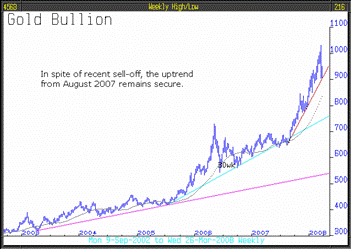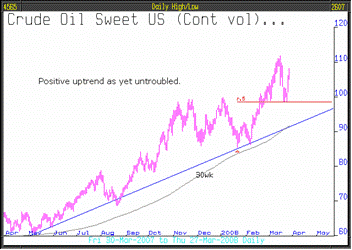Get the latest financial news, insights and expert analysis from our award-winning MoneyWeek team, to help you understand what really matters when it comes to your finances.
You are now subscribed
Your newsletter sign-up was successful
Want to add more newsletters?

Twice daily
MoneyWeek
Get the latest financial news, insights and expert analysis from our award-winning MoneyWeek team, to help you understand what really matters when it comes to your finances.

Four times a week
Look After My Bills
Sign up to our free money-saving newsletter, filled with the latest news and expert advice to help you find the best tips and deals for managing your bills. Start saving today!
Think of any market you like and look at its history and you will find a time when to remain invested in that market would have been a financial disaster.
From 1929 the US stock market fell 90% it did not regain 1929 levels until the 1950s! From 1972 the UK stock market fell by 75% it did not regain 1972 levels until 1983 and inflation for that period was massive! From 1990 the Japanese stock market fell over 75%, it is still nearly 75% down! From 1980 gold fell nearly 75%, only now is the price higher. If post war, you had held UK gilts then by 1980 the value of them would have been smashed to pieces. War loan still trades below par.
Inevitable volatility but nothing to frighten the horses
MoneyWeek
Subscribe to MoneyWeek today and get your first six magazine issues absolutely FREE

Sign up to Money Morning
Don't miss the latest investment and personal finances news, market analysis, plus money-saving tips with our free twice-daily newsletter
Don't miss the latest investment and personal finances news, market analysis, plus money-saving tips with our free twice-daily newsletter
Headline in the Financial Times, 24th March 2008, "Commodity prices fall as hedge funds cut exposure". All commodity prices, which had been very positive, suffered significant setbacks gold which had peaked at $1,030.80 fell to $905.60/oz, crude fell from $111.80 to $98.70 per barrel. Other commodities such as base metals and agricultural commodities suffered larger setbacks.
We take this opportunity to publish the updated chart for gold (below). So far there is nothing to frighten the horses. The latest uptrend from August 2007 for gold is still intact. So far, gold has already bounced back to $950/oz. We don't think for one moment that the bull market for gold is over, but some volatility is inevitable. If the trend from August sustains, the short-term outlook is very exciting. One of our favourite indicators is the 30-week moving average, which is currently at $832. Whilst the gold price remains above the 30-week moving average, the primary bull market for gold is secure.

When long-term investors win
Hedge funds, by their very nature, are heavily geared investors; for that reason, they have to bail out quickly to protect profits and avoid horrific losses that arise when geared investments, even in the short-term, go wrong. If commodity prices hold where they are now, it's a typical weak hands to strong hands deal weak hands, short-term geared traders cause prices to fall and strong hands, long-term investors, step in and say thank you very much.
Also look at the chart for crude oil to see the latest action here again, nothing to frighten the horses.

Is it demand or is it speculation?
Javier Blas in the FT on 26th March reported that an index of Non-Exchange Traded Metals such as iron ore had risen since 2002 by 598% whilst an index of exchange traded metals rose only 246%. On the surface this suggests that the commodity bull market is more demand driven than some analysts think.
In the final analysis, most of these commodity-based investments will continue to benefit from further dollar weakness. It's interesting that the sell-off they have suffered was, so far, simply correlated with a short period of dollar strength together with post Bear Stearns relief.
By John Robson & Andrew Selsby at fullCircle Asset Management, as published in the threesixty Newsletter, a fortnightly newsletter that gives insight into the investment markets.
Get the latest financial news, insights and expert analysis from our award-winning MoneyWeek team, to help you understand what really matters when it comes to your finances.
MoneyWeek is written by a team of experienced and award-winning journalists, plus expert columnists. As well as daily digital news and features, MoneyWeek also publishes a weekly magazine, covering investing and personal finance. From share tips, pensions, gold to practical investment tips - we provide a round-up to help you make money and keep it.
-
 Should you buy an active ETF?
Should you buy an active ETF?ETFs are often mischaracterised as passive products, but they can be a convenient way to add active management to your portfolio
-
 Power up your pension before 5 April – easy ways to save before the tax year end
Power up your pension before 5 April – easy ways to save before the tax year endWith the end of the tax year looming, pension savers currently have a window to review and maximise what’s going into their retirement funds – we look at how

